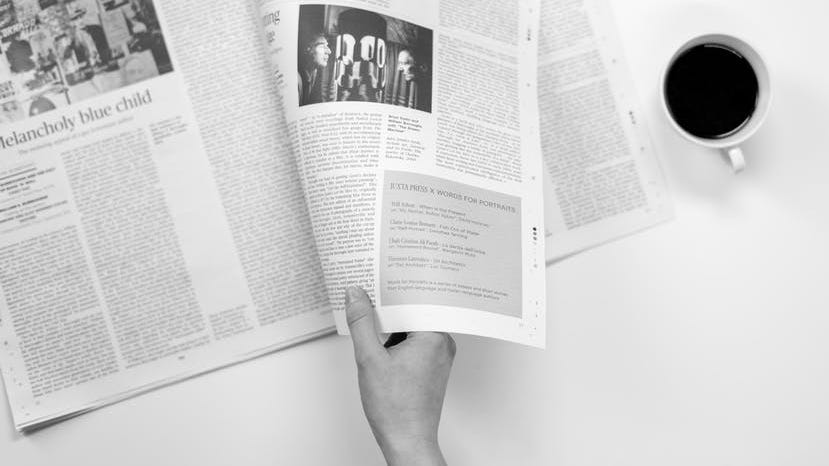Coffee News Roundup: Week Ending April 22nd
This week, disposable coffee cups release trillions of plastic particles, Europe's coffee chains are doing better, and Starbucks' flagship Reserve Roastery in Seattle votes to unionize.
Hello and welcome to another Coffee News Roundup, coming to you from the gloriously sunny Scottish highlands where the neighbour’s cat Merlin is staring directly at me from the garden.
Let’s see what’s been going on.
To-Go Coffee Cups Shed Trillions Of Plastic Particles Under Normal Use - via New Atlas
Happy Earth Day! Here’s some bad news about disposable coffee cups.
Well, not just them—other plastic too. But including “coffee” in the headline is a guarantee that news companies (and the snarky blogs that feed off them) will talk about it. And here we are.
Anyway, a new study from the US National Institute of Standards and Technology (NIST) looked at the way two commercial plastic products—food-grade nylon bags, used to make baking liners, and plastic-lined single-use beverage cups—degrade and release particles under normal use.
The goal, according to New Atlas, was to examine the way plastic pollution moves through the environment, including migration into the human body.
The coffee cups, lined with low-density polyethylene (LDPE) film, were exposed to boiling water for 20 minutes. To examine the nanoparticles released, researchers sprayed the sample in a fine mist and then allowed it to dry, leaving behind just the microscopic plastic pieces which could then be processed, analyzed, and counted.
What they found: trillions of particles, averaging 20 to 80 nanometers in size—and the food-grade nylon had seven times the number.
Particles that small can slip into human cells, and nobody really knows how bad that could be—but it could be really bad, like alter-the-shape-of-lung-cells bad.
“The main takeaway here is that there are plastic particles wherever we look," said NIST chemist Christopher Zangmeister. "There are a lot of them. Trillions per liter. We don’t know if those have bad health effects on people or animals. We just have a high confidence that they’re there."
Chains Lead Regrowth In Europe’s Coffee Retail Market, According To World Coffee Portal - via Daily Coffee News
Oh good. We wouldn’t want the chains to suffer.
The European coffee shop market grew 3.2% over the past 12 months, according to the latest report from World Coffee Portal—the majority of those being large chains. Costa Coffee, McDonald’s McCafé, and Starbucks led the way in opening new locations, alongside Russia’s One Price Coffee.
The report was finalized before Russia’s invasion of Ukraine, which could skew the numbers—especially as, “prior to the invasion, Ukraine had been the fastest growing branded coffee shop market in Europe, expanding by 16% over the last 12 months to reach 259 outlets,” according to World Coffee Portal.
In the United States, meanwhile, another report, this time from the National Coffee Association, puts coffee consumption at a 20 year high, with 66% of Americans now drinking coffee daily. That’s up 14% from January 2021 and more than any other liquid—including, somewhat worryingly, water.
Staff At Starbucks Flagship Store Vote To Unionize In Major Victory For Nationwide Campaign - via The Independent
There will be more Starbucks-related news down below, but this felt worth highlighting: the flagship Reserve Roastery in Seattle, the jewel in Starbucks’ high-end Reserve crown, voted to unionize this week.
One of just six Reserve Roastery locations around the world, the Seattle location is considered a tourist draw, and is described by the company as “an immersive and dramatic expression of our passion for coffee”.
Workers said that the prestige and popularity of the store brings increased responsibilities and pressures—without the pay to match. Employees work in a “completely full-service environment,” barista Brennen Collins told the Seattle Times. “We’re busing tables. We’re crafting a story. … We’re generally making as much as the core Starbucks, while also having all these increased expectations — all on top of working inside of a pandemic.”
Starbucks denies this, of course, but said that it will “respect the process and will bargain in good faith”. Meanwhile, as we’ll see below, the company’s anti-union campaign continues apace.
More Headlines
Fresh Cup Magazine is back! Read the relaunch letter: Hey Friends, Let’s Pour a Fresh Cup
China to Boost Coffee Imports as Young Professionals Drink More
ICO Announces Collaborative Research to Support Coffee Farmers in Peru
American Airlines Is Bringing Back In-Flight Espresso Service
When the Rust Settles: Uncovering the Movements of Coffee Leaf Rust Disease
The Week In Coffee Unionizing
Time to break out the bullet points once again, this time for a Starbucks-focused mini-roundup.
The National Labor Relations Board (NLRB) is suing Starbucks to force the company to reinstate three activists who the board says “had illegally been fired, forced out, or placed on leave.” The retaliation came “because of their involvement with the union and their participation in the NLRB’s own investigations”, according to Bloomberg.
Starbucks has filed its own complaints with the NLRB, alleging that Workers United intimidated workers, but is only doing it “to protect the physical safety and emotional wellbeing of our partners” according to a letter sent to employees. “It takes a lot of gall for a company that’s launched one of the most aggressive & intense anti-union campaigns in modern history to file these charges,” the union said in a statement to CNBC.
Speaking of anti-union campaigns, returning CEO Howard Schultz pleaded with Starbucks managers to more actively intervene in the organizing process at the stores they control in a leaked video call. Schultz referred to the unionizing baristas as “an outside force that’s trying desperately to disrupt our company,” while the company pays a literal outside force—”union-avoidance” law firm Littler Mendelson—to thwart the process.
All this hullabaloo is not going unnoticed by Wall Street, either. Since Schultz took over, Starbucks shares have fallen 12%, and the company “risks its long-held reputation as a progressive company the longer it battles union efforts,” according to CNBC.
Oh, and lots more stores voted to unionize this week. Aside from the Seattle roastery, five stores in Virginia and one in Denver, Colorado, voted yes on forming unions.
The Week In Corporate Coffeewashing
It wouldn’t be Earth Day without some amount of coffeewashing, and Costa Coffee has come through with a classic: the company, owned by Coca-Cola, is trialling “100% fibre lids” that “are made from renewable plant-based material” in a bid to lower its carbon emissions.
Coca-Cola, you might remember, was named the top plastic polluting company in 2020.
Costa is also “working simultaneously on three key areas within our packaging – Reuse, Reduce, Recycle,” according to its global brand & sustainability director Deb Caldow. Notice how the phrase is flipped around so that reduce—the most important of the three, but obviously the one that Costa wants to focus on the least—is less prominent. “Our aim is to encourage consumers to adapt reuse regularly,” Caldow said, marking another tile on the Greenwashing Bingo by putting the responsibility onto the customer.
Meanwhile, perhaps trying to take the focus off its faltering anti-union campaign, Starbucks is “supplying a $4.2 million grant that is expected to result in 22 million new arabica coffee trees plus early-growth fertilizer among thousands of farmers in Colombia,” according to Daily Coffee News. Or, as Global Coffee Report’s headline puts it, “Starbucks helps plant an extra 22 million coffee plants in Colombia,” which is probably exactly the headline the company wanted.
Is Coffee Good For You?
Nothing to report this week, which is probably good considering the length of this Roundup.
What To Read
2022 US Barista Champion Morgan Eckroth: The Sprudge Interview by Zac Cadwalader
What Is Latte Art? by Liz Clayton
Opinion: The End of Coffee is Near by Sam Knowlton
Until next week, drink good coffee.






